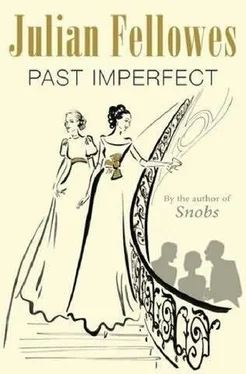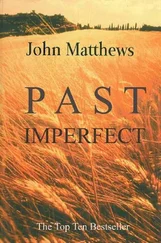‘Pay no attention,’ said his wife firmly and led me away to where the other young stood. The party was more of an age mixture than usual as most of the mothers and fathers of the girls, if not the boys, were to be with us for the evening, so I met a couple of pleasant enough bankers and their wives, together with a rather pretty, Italian woman, Mrs Wakefield, married to Lady Dalton’s cousin, who’d come up from Shropshire to begin the launch of her youngest daughter, Carla. We moved on to the girls themselves. Among them was a plain and russet-faced character, Candida Finch, whom I’d already met. To be honest, I had found her a bit uphill, but we were programmed in those days to make conversation with anybody nearby and so I fell into the small talk demanded of me without much hardship, naming mutual acquaintances, reminding her that we had both been at this drinks party and that one, although we had never spoken more than a few words to each other before now. She nodded and answered, civilly enough but, as always with her, too loudly, too aggressively and, every now and then, with a sudden, stentorian laugh that made you jump out of your skin. Of course, now I can see that she was very angry at what had happened to her life, but one can be so blind and so heartless in youth. I looked at the grown ups sipping their cocktails at the other end of the room.
‘Is your mother here?’
She shook her head. ‘My mother’s dead. She died when I was a child.’ This was, of course, rather more than I had bargained for and her voice, as she said it, was raw. I muttered vaguely about being sorry and how I must have muddled her with someone else as I thought I’d seen a photograph of them together in a magazine. This time she spoke with considerably more authority. ‘You mean my stepmother. No. She is not here. Thank God.’ There was no mistaking the tone and the expletive at the end was presumably intended to bring me, and anyone standing near us, up to date with the way things were between them. I wonder sometimes why people can be so anxious to share their unsatisfactory domestic situation with strangers. It must be because it is often the only arena where they have the power to say what they think of the people concerned and there is some satisfaction in that. Anyway, I grasped the situation. It was not, after all, a very unusual one.
As I later learned, Candida’s was a sad story. Her mother had been the sister of Serena Gresham’s mother, Lady Claremont, making the girls first cousins, but Mrs Finch had died in her thirties, I don’t think I ever knew what of, and her widowed husband, already rather looked down on in the family, had proceeded, once his tears were dry, to make what was referred to as an ‘unfortunate’ marriage to a former estate agent from Godalming, saddling Candida with an unhelpful stepmother, whom incidentally she detested, and the Claremonts with a nearly-sister-in-law from hell. To make matters worse, when the girl was in her early teens, the father, Mr Finch, had also died, of a heart attack this time, leaving Candida entirely in the clutches of his widow, to whom he had left every penny of what remained of his fortune, as well as custody of his daughter. At this point her aunt, Lady Claremont, had stepped in and tried to take the reins. But Mrs Finch from Godalming was no pushover. She was deaf to any advice on schooling and it was only with the greatest difficulty that her permission had been gained for Candida to do the Season, for which, so one gathered, Lady Claremont was footing the bill. Obviously, all this placed the girl in an invidious position, which one might have sympathised with more, had it not been reflected in her loud and awkward manner. Nor was she helped by her appearance, with her dark, unruly, frizzy hair somehow compounding the complexion of a navvy. She had freckles, too, and a nose straight out of Pinocchio. All in all, Candida Finch had been dealt a tough hand.
‘Right. Time to leave, everyone.’ Lady Dalton clapped her hands firmly. ‘How are we going? Who’s got a car?’ Some of the fathers drained their double martinis and held up their hands.
One detail of the different world I once inhabited that is not often referred to, but which affected every minute of almost every day, was the traffic. That is to say, there wasn’t any. Or none to compare with today’s. The cars one encounters now midmorning on a normal weekday in London would only have been seen at six o’clock on a Friday night in late December, as people were leaving town for Christmas. The whole business of parking being impossible simply hadn’t started. The time you allowed for a journey was the time it would take. London, or the London most of us occupied, was still small and it was rare that one left more than ten minutes before any appointment. In terms of the general stress of being alive, I cannot tell you what a difference it made.
Another contrast with today concerned the area we lived in. To start with, in London, the upper middle, and upper classes had not yet strayed from their traditional nesting grounds of Belgravia, Mayfair and Kensington – or Chelsea, if they were a bit wild. I remember my mother driving me past a very pretty Georgian terrace on the Fulham Road, before one gets to the football ground. I admired the houses and she nodded. ‘They’re charming,’ she said. ‘It’s such a pity no one could ever live here.’ And if Fulham was outside the pale, Clapham, or worse, Wandsworth, had no hold in their lives or on their mental map whatever, other than as the place where their daily lived, or where one might get glass cut or rugs mended or find a cheaper saleroom. This would soon change when my own generation started to marry and the gentrification of the south bank of the Thames would begin. But in the late Sixties it had not quite happened yet. I remember distinctly driving with my parents to have dinner with some impoverished friends of theirs, who, faute de mieux, had bought a house in Battersea, just at the dawn of the new era. As my mother carefully read the scribbled directions to my father at the wheel and the location of our destination became ever clearer, she looked up from the paper. ‘Have they lost their minds?’ she said.
One must remember that, until the middle Sixties at any rate, there was fairly cheap housing to be found in any part of the city, so there was no pressing need to move out. One might not occupy a palace but that didn’t mean one couldn’t stick around. We lived at one time on the corner of Hereford Square and, behind the west side, if you can believe it, lay a small field where someone kept a pony. In the corner of this was a cottage, probably originally part of some stabling arrangement, and in my mid-Fifties childhood it was lived in by a not-very-successful actor and his potter-wife. They were delightful and we saw a lot of them but they must have been as poor as church mice. Still, there they were, living in a cottage on the corner of a fashionable square. The next time I entered that building was thirty years later. It had been rented by a Hollywood star who was shooting a movie at Pinewood. Recently it retailed for seven million. The result of the property boom was not just the dispersal of people from their home territory, but the end of the ‘mix’ in London’s population. Struggling painters and penniless writers no longer live in the mews cottages in Knightsbridge or behind Wilton Crescent, where they would once rub shoulders with countesses and millionaires in the local shops and post office. Teachers and poets and professors and explorers and seamstresses and political subversives have all been driven away. They have been replaced by bankers. And we are the poorer for it.
The Great Room at Grosvenor House was an appropriate setting for the formal opening race of the Season. It twinkled with that now distinctive, self-important, 1960s, sub-deco glamour, so memorably christened ‘Euro-Splendour’ by Stephen Poliakoff. One came through the hall of the hotel on to a kind of gallery, where a wide, aluminium-balustered staircase within the room itself led down towards the gleaming floor below. At the sight of it I was suddenly glad that I had come. It was early June, and a warm night, too warm for the boys’ comfort, really, as our tails in those days were made from woollen cloth, but there is something about a party on a warm summer night that always seems to promise much. Usually more than it delivers.
Читать дальше












